#lonely and how she's perceived in court but these thoughts are not fully developped yet I need more Time
Text
I’m going to say something a little bit controversial here. But I’m maybe the only person on Earth who actually loved the Game of Thrones finale.
Please keep in mind of course that I am basing this mostly from the perspective of a fan of the books, who has seen a handful of episodes, (well, all of season 1 now. But only the sporadic episode after that). I’m saying this because it means my evaluation of the finale is less based on its execution (which from what I have seen is a little, um, spotty) and more based on the overall story that I perceive from the books/first season/sporadic episodes.
So, basically take me with a grain of salt as I talk about what I genuinely loved about the Game of Thrones finale. But anyway, these are things I’ve loved about the finale, in no particular order.
1) That NONE of the prophecies fully came true.
One of the big complaints I’ve seen, understandably so, is that Jaime should have killed Cersei, per the Valonquar prophecy. That Cersei wasn’t really supplanted by a younger and more beautiful queen (since Daenerys never really sat on the Iron Throne, her ultimate successor was Bran). That Arya never killed that last significant green-eyed person. That the three-headed dragon thing came to nothing. And so on and so forth.
But that’s actually what I loved about it.
See, ONE missed prophecy is a plot hole. The writers either forgot how to fit it in, or wrote themselves in a corner. But here, EVERY prophecy is missed in one way or another. NONE of them fully came true. And that strikes me as very much intentional.
Game of Thrones is has a number of characters who have destroyed their own lives, or at the very least, made their lives a shit ton harder than they needed to be because of fucking prophecy.
Rhaegar is the biggest example, of course. Rhaegar is so obsessed with the idea of a three-headed dragon that he discards his actual wife and children, because she can’t give him a third, to start fresh with someone else. By doing this, he actually ends up destroying his family. TWICE.
By kidnapping Lyanna, he provides the last straw for Robert Baratheon and Eddard Stark to bring down the Targaryen line. And then the child he creates finishes the job by killing Daenerys as she’s finally taken their throne back.
Aerys was always going to be a problem, but he’s a problem that might have been ended with a coup and a Regency in favor of his far more reasonable son. Rhaegar was the one who ensured that the Targaryens as a whole would fall.
Cersei is another example. Her obsession with the Valonquar prophecy caused her to alienate her brothers and treat every perceived rival with harshness and suspicion. She lost her chance at valuable allies and assets because of this.
Basically, in the GOT world, prophecies are bullshit and people who follow them bring about their own doom. And I really enjoy that.
2) Daenerys Targaryen was never going to sit on the Iron Throne
Please, don’t get me wrong, I have a lot of sympathy for Daenerys fans who were disappointed with her ending, but to be perfectly honest, I’ve never believed that Daenerys would actually sit on the Iron Throne.
If anything, I think ASOIAF/Game of Thrones is a criticism/deconstruction of the idea of right to rule by blood or conquest.
The Targaryens conquered Westeros hundreds of years ago, on the might of their dragons. They ruled absolutely, by fire and blood. Baratheon took the throne by right of conquest. Cersei Lannister took it through marriage, and then violence in her own right.
None of these rulers were just. None of these rulers were happy. (Well, Aerys seemed somewhat happy while burning people alive.) None of these rulers did well by their people.
This extended into general Westerosi politics, the court at Kings Landing, the War of the Kings, all full of people so obsessed with this giant game of musical chairs that none of them had any idea of the threat(s) on their horizon nor any real interest in protecting their people from it.
By the end, though, we have a real change. While they did laugh at the idea of an all-out democracy (which was annoying, though I don’t think it would have been realistic for them to support it at this time), we still end up with rulers that have been explicitly chosen by at least SOME of the people that they rule.
It was never going to be Daenerys though. The theme couldn’t work that way. Even if somehow she could have gained enough popular support on a Watsonian level from the Westerosi people, she’s a Targaryen. On a Doylist level, she would still be the rightful princess by blood who took her throne back by conquest. There is no way that the Dany could sit on the throne without destroying that theme. (And that rules Jon out too, for the same reason. Even if he were chosen as Bran was, there’d be an undercurrent that he “deserved” it because of his ancestry.)
The tragedy of Daenerys is that if she had only stayed in Essos, she could have lived a long and happy life, as a beloved liberator. In Essos, she was a just ruler. She spent her wrath on slavers and killers. She was chosen by the people that she ruled. She did screw up in Meereen, but she could have learned from that.
But it wasn’t enough for her. She wanted Westeros. She felt she was entitled to Westeros. And that was always going to go very badly. When I think about Daenerys as a queen, she reminds me of Sansa’s statement that if she were queen, she would want to make people love her. In a way, Daenerys is the embodiment of that idea. She was raised on the idea that her family were rightful, beloved rulers and that the common people were begging for their return. And well, that’s not Westeros.
To the people of Westeros, Dany represents the return of something only slightly less terrifying than the Night King. They don’t want her. They don’t love her. They certainly would never choose her. And Dany’s lived her entire life around a lie. While I think her fall could have been done better, I can see why it happened.
I was hoping that Dany would figure out that she didn’t want the throne, and that she would go back to Essos and the people who love her. But she didn’t.
Drogon burning the Iron Throne wasn’t subtle, but it was an indication that with her death, the rule of absolute autocrats who seize their throne by power is over.
3) R+L=J mattered, but not how we thought, and Jon’s ending was the happiest that it could have been
One critique I keep seeing is: why did it matter that Jon was a Targaryen?
And I think it mattered for a number of reasons:
First, of course, is that as mentioned above: it meant that Rhaegar really did bring about the absolute destruction of his entire dynasty.
Second, it reinforces the idea of nurture vs. nature. For better or worse, Jon Snow will always be a Stark. He might not be the wisest person in the room, but he always tries to do the right thing. He owns his mistakes. If he has to kill, he does it with his own hands, as cleanly as possible. No matter who his parents actually were, he is and always will be Ned Stark’s son.
And third, as mentioned, it completely removes Jon from the running for the throne. Because after Daenerys’s rampage, NO ONE will want to see another Targaryen in charge. Even if Jon really isn’t one at heart. I feel like Jon’s exile was less about the Westerosi seeing him as a traitor, or appeasing Grey Worm, and more about making sure that the last Targaryen will never be in a position to finish what his aunt started.
Really, getting exiled to the North is probably the happiest ending possible for Jon. He’s never wanted to rule, and if he DID get the throne, he’d be positively miserable. If he DIDN’T end up on the throne, he’d be a walking threat to whoever did get it. IF he were allowed to live, he would be a perpetual tool to be used against the current regime. They would never let him live in peace.
This is why Bran and Sansa didn’t and won’t pardon him, by the way. It’s not because they don’t love their brother, but if they did, then he would just get pulled back into all this bullshit. He’s the last Targaryen. There’s no escape.
(Also, they can’t just pardon him because they’re not autocrats. Tying into that theme again.)
4) All the Starks had good endings
I don’t really understand all of the fans tearing their hair out about Arya leaving to explore, or Sansa sitting “alone” on her throne.
When Ned Stark said that the lone wolf dies, but the pack survived, he wasn’t saying that all of the Starks had to stay under one roof. Sansa and Arya were always intended for marriage. Jon was probably always intended for the Wall.
The ending reinforced the idea that even if they are physically separate, Bran, Sansa, Arya and Jon will always be connected.
Arya has always had an adventuring spirit and way back in season 1 asserted that marrying a lord and being the mother of knights and princes was never going to be her fate. So it makes perfect sense that she’d want to see what else is there, with her own eyes. And really, she’s eighteen. She has time to do what she wants and then come back home.
Sansa is the Queen of the North. She’s chosen by her people. And as we saw, they love her. Sure, she’s not married yet. But she’s going to have plenty of offers. And she’s got PLENTY of time. She’s twenty-one-ish, right? Nothing about her ending rules out love later.
And the people who think it negates her development because she’s always wanted to be a queen are being silly. As a young girl, Sansa wanted to be a “queen” because that’s what one did when one married a prince. She wanted love. She wanted acceptance. She had no idea of the responsibilities or duties of ruling at the time. But over time she learned to be a powerful person in her own right. And she rules now, in her own name, by her own merit. That’s important.
Bran’s ending feels the most off in the show, but as a book reader, it does make sense. It IS a little funny that they chose a Stark, but the North still declared independence. It makes sense though. The North probably would have been willing to follow Bran Stark, but they’re tired of having their rulers chosen FOR them by the South. And that’s understandable. Right now it’s Bran, but who’ll be next? (I’d like to think that Dorne and the Isles follow suit. I don’t feel like Bran would want to hold any kingdom unwillingly.)
The execution should have been done better, but in terms of the Starks, I think they got good endings.
5) Not all redemption arcs happen
The ending I was most disappointed by was Jaime Lannister’s. As a book reader, I always found Jaime’s chapters really compelling. I remember being so amazed that Martin could start a character off with an act as heinous as pushing a child out the window, and somehow make me still like him. I really wanted the Valonquar prophecy to come true (Jaime is after all, younger than Cersei). I wanted Jaime to choose Brienne and Tyrion, and become a better person. I figured he was probably doomed, but that he might get a heroic death.
He didn’t.
At the same time, while I’m disappointed by Jaime’s choice, I don’t necessarily think he got the wrong ending. There are other redemption arcs in GOT (see: Theon), and maybe it’s time to see the handsome and tortured asshole with the deep down potential for good actually fail.
I don’t really think it’s out of character for Jaime to not care that much about the people of King’s Landing. Yes, he once killed a king and sacrificed his honor to protect the people, but that was when he was nineteen years old, and he’d been punished for it ever since.
I’ve wondered sometimes if Jaime wouldn’t have been better off if Robert hadn’t pardoned him. If Jaime had gotten sent to the Wall, like Jon, he might have had a chance to grow into someone separate from the machinations of his family. He would have had an honorable cause. He wouldn’t have gone through life every day, having his “crime” and his lack of honor thrown in his face to the point where he seemed to have decided “fuck it, I’ll be as terrible as you say I am”.
Certainly the man who pushed Bran out the window didn’t give a shit about innocent lives at that point. The man who ambushed Ned on the streets of King’s Landing and cut down every one of his men didn’t care too much about fair play. Now he was changing, undoubtedly. But sometimes it’s not enough. In the end, Jaime chose Cersei. The prophecy fizzled. And they both died, probably kinder than they really deserved.
Anyway, we’ll probably see a lot of thinkpieces and bits about how George R.R. Martin’s endings will be VERY DIFFERENT from the show. And maybe they will. But it wouldn’t surprise me if they aren’t. Because I think the ending actually does fit, even if the journey got a little derailed.
4 notes
·
View notes
Text
Captain Harlock & Miime: Musings on Isolation, Loneliness and Grief
(For the scope of the analysis I will be focusing solely on the Harlock/Miime relationship as it is portrayed in the 1978 Space Pirate Captain Harlock TV series. If you haven’t watched this anime yet, you really need to.)
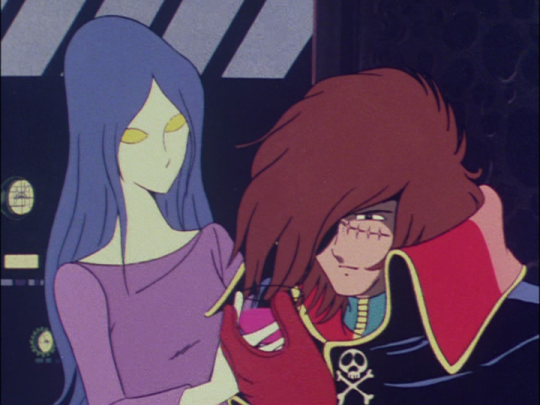
“I am Miime; I am the woman who has given her life to Harlock.” - Miime, SPCH
It did not take me long into my sojourn into the 42-episode long self-contained Space Pirate series (and my first Matsumoto anime) to discover just how much I loved Miime, the tall willowy, mouthless, alcohol-swilling, harp-playing, soft-voiced alien woman whose relationship with Harlock is almost as meaningful and touching (in this series) as the relationship between Harlock and Tochiro.
Miime quickly became an exemplar of everything I wanted to see in a supporting female character. I already knew what I didn’t like: female characters who nagged, female characters who made the primary male characters awkwardly uncomfortable, who made them stammer, blush and act like idiots (if they were of high-school age) or forced them to supplant their ideals and opinions with their own, either through sheer bitchy determination or the pervasive ‘power of love’ angle (if they were older and *allegedly* mature). I didn’t know what I hated more: the female characters who ruthlessly and annoying imposed either their emotions, ideals or bodies onto their male counterparts, or, conversely, the male characters who allowed them to do so and conceded to the woman’s wills. I’ve always been more interested in fictional male protagonists then in female ones, and I always view the arrival of a new female character – be they hero or villain – into a novel or show with a certain amount of trepidation, owing to the drama they ineffably inflict upon that particular fictional universe, whether this is intentional on their part or not.
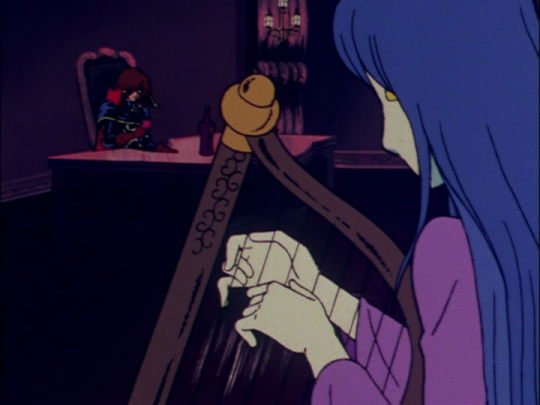
Miime was blessedly free of all of the above behaviors. Everything about her, from her simplistic yet elegant character design, to her voice, mannerisms and hobbies, spoke of maturity, of refinement, and, most important to me at least, the desire to be true to her own person, to remain herself, as she is the last living remnant of her race. Perhaps if she had been a human woman her relationship with Harlock would have been radically (an unsurprisingly) different, but as she is a Juraian, an alien, a literal ‘Other,’ she abides by her own codes of conduct and not once does Harlock ever request or demand that she alter her behavior towards him, just as she never tries to ‘change’ him, as most human woman would try to do.Thus she remains unique, mysterious and ultimately unknowable - much like Harlock himself.
And the relationship the two of them share is unique indeed. Harlock makes no demands upon Miime whatsoever. She has no specific duty as a crew-member of the Arcadia and is free to move about the ship as she pleases. She pours Harlock his wine, but not because she is his serving girl and it is her duty to do so; she plays the harp for him, but not because she is his court musician and it is expected of her. Everything she does for Harlock is for their mutual enjoyment. They do not ask or demand anything from one another, they simply do things together, organically and naturally, in complete emotional and physical freedom. They are perfectly at ease with each other, displaying no awkwardness or stress when together. Miime does not bicker with, fight with, flirt with, nag, challenge or impose on Harlock’s freedom in any way. She has pledged her life to him, even stating she would follow him into hell if he ever asked her to. Her devotion is total. Her loyalty is beyond reproach (1). Her relationship with the Arcadia’s brooding Captain puts her in the unique position of possessing true knowledge of his personality, allowing her to share her insights as to what kind of man he is with the other crew-mates, who are often confused by Harlock’s decisions and actions. She becomes his unofficial spokesmen and advocate and never doubts that he will accomplish his goals.
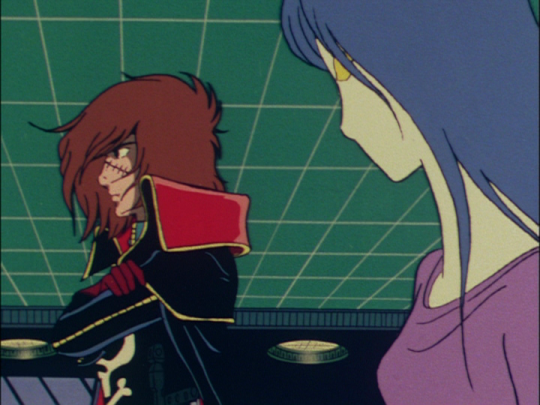
Likewise, Harlock confides in Miime, telling her his plans, expressing his occasional doubts and frustrations or simply reminiscing about the past, often over drinks. But Miime is not a merely passive character Harlock keeps around as a drinking companion. Miime proves her worth as a fighter, displaying competent shooting-skills and reveling hidden depths of power when Harlock is threatened. Unlike Tadashi Diaba, however, she is not learning how to become a warrior or out for revenge against the Mazone invaders. Like Harlock, much of her story has already taken place and she has already reached the pinnacle of her character development. To remain at Harlock’s side is enough; she has no set goals or plans like Tadashi, no ulterior motives or hidden agendas. Whatever else is happening to the galaxy at large is inconsequential as long as Harlock continues to wander the stars under his ‘flag of freedom.’ Calm, quiet and thoughtful, Miime stands unobtrusively by Harlock on the command-bridge, ready to give advice or make pointed observations, or fills his cabin with the soothing melodious music that relaxes him while the rest of the crew revels in the Arcadia’s corridors, living for the moment while their haunted Captain broods on the fate of humanity, vowing to fight to the end to protect the earth even as he bemoans the hedonistic apathetic state of mankind. Miime is the only one he truly confides in, and Miime repays his trust by simply being there and supporting him (sometimes even saving him), regardless of the circumstances.
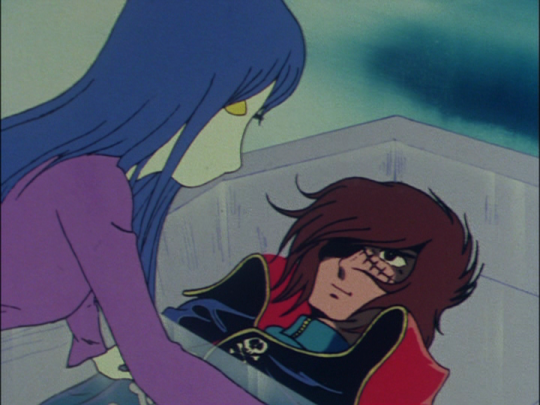
But what truly bonds them? Why do they enjoy one another’s company so thoroughly? Why do they understand and respect each other so fully? What lies behind the simple dignified tenderness they display towards each other? They are not lovers; they display virtually no hint of romantic infatuation or physical attraction. Yet despite retaining their autonomy and personal freedom they still share a certain bond, an intimate relationship which seems to transcend both love and friendship. But this bond is, sadly, rooted in tragedy and grounded by the threefold components of isolation, loneliness and grief.
I: Isolation
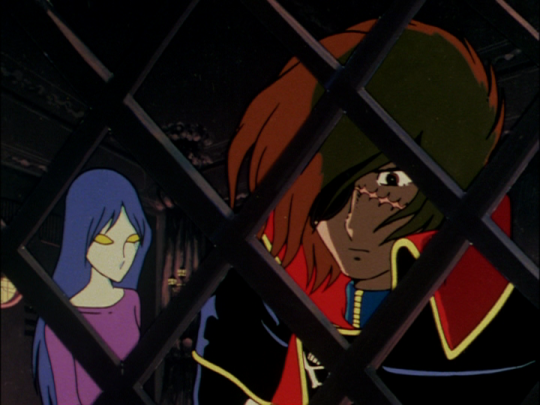
One sad reality of Harlock’s existence is that he is an extremely isolated individual. Although the entire universe is essentially his sandbox and the Arcadia possess enough firepower to level cities and hold off entire alien fleets, Harlock never takes advantage of his considerable power and fearful reputation to make the rest of humanity do his bidding or live according his higher standards. Planet Earth is not a sheltering or welcoming place for the self-exiled space-pirate. Harlock has no wish to dominate, but he will not suffer himself to be dominated, so he endures the derision and scorn of Earth’s rulers and the constant harassment of the planet’s Defense Force with little genuine retaliation, preferring to roam the stars in hopes of finding his ‘final resting place.’ Despite having a homeworld and a people, Harlock, both by choice and circumstance, lives out a solitary and confined existence, with only those few chosen comrades who remain with him in order to fight for their own beliefs and carve out their own paths.
Miime shares in this isolation; for although planet Jura still exists her race has been completely destroyed in nuclear warfare and the following environmental retaliation brought on by the planet’s sentient plant-life. In a brief flash-back, a younger Harlock visits Jura and rescues Miime, now the last Jurian, from the plants and offers her refuge aboard his ship. Not only does Miime owe her life to Harlock, she also is allowed to live on his ship seemingly condition-free. Harlock has no utilitarian motives - neither practical or personal - for keeping her around. Miime does not cook or clean or fly Space Wolves or man any of the Arcadia’s guns; she is not a doctor, a scientist or a navigator. The bulk of Harlock’s otherwise human crew seem mostly indifferent to her presence; they do not compete for her attention or affection, nor do they make advances on her. Even aboard the Arcadia Miime remains in isolation and because Harlock also lives in voluntary isolation, spending most of his time in his elegant sterncastle drinking, brooding and playing his ocarina, their mutual situations and circumstances draw them closer together in a relationship built upon what is missing in their lives rather than what they have in common. They are both unique one-of-a-kind individuals, alone in a cold inhospitable galaxy that has little to offer them in terms of meaning and fulfillment. Even when together, isolation still dominates, for although Miime and Harlock spend a great deal of time alone behind closed doors there is always a significant physical distance between them. Both are heavy drinkers (Miime requires alcohol to survive, as it it is a natural part of her diet; Harlock is an alcoholic), but we never see them genuinely intoxicated and acting stupid, flirty or inappropriate with each other. In their isolation is also their liberty, for being who they are - free, above all things - they are under no obligations or expectations to behave in certain ways. Harlock and Miime have nothing to prove to each other or to anyone else. Their relationship remains fixed and unchanging amid a universe full of chaos, danger and constant strife. They can always rely on one another - their isolation is their safeguard and shield; perhaps it is not such a tragic state after all.
II: Loneliness
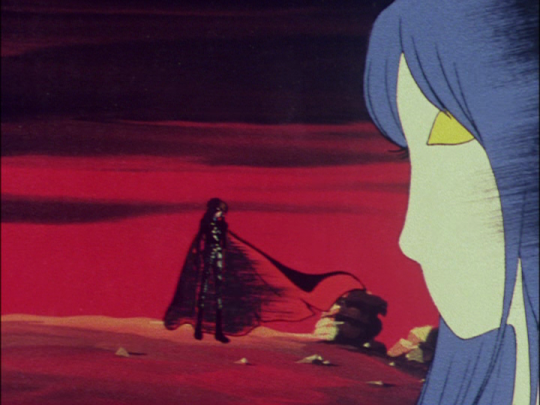
There is - or should be - a distinction drawn between someone who is physically alone and someone who is feeling lonely. For most people, the two aspects are one and the same. If there is no one around you, no one to talk to or interact with in some manner, this will be perceived by most as a negative state, one which they quickly rectify by either calling or visiting friends, chatting online or making plans for family gatherings and meaningful dates with significant others. To be alone with oneself, with ones’s own feelings, thoughts and memories without any distractions for an extended period of time, is hard for most people to handle - for most, but not all. I myself am an unapologetic loner. This is not due to shyness or social ineptness; I am merely extremely introverted. As I write this part of the article I am alone in the house (except for a sleepy old pit-bull) and I love it. This is the main reason I became so attached to Harlock and Emeraldas - they are both loners living according to their own codes and beliefs, following their own paths and perusing their own destinies (2). The Arcadia - which serves the duel purpose of being Harlock’s fortress, safe-haven and tomb - enables him to remain free and unattached to the rest of humanity, liberating him from the confines of mankind’s apathetic degenerate social state and allowing him to remain true to his own self and goals.
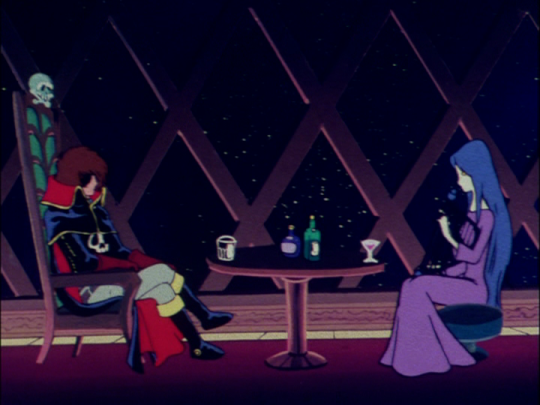
But although Harlock is a true loner and possesses a solitary nature, he still suffers from genuine loneliness from time to time, although the only other human he intentionally seeks out to spend quality time with is Tochiro’s seven-year-old orphaned daughter, Mayu, which he does at his own peril. Miime, on the other hand, suffers loneliness even more keenly. Harlock, at least, can draw comfort (however sparse), in that he actually has a home-planet and a race to protect (even if he wants nothing to do with them), while Miime is the last of her kind - the last Jurian. Her planet still survives but the Jurian civilization is now nothing but ruins overrun by hostile plant-life. There is no going home for her. Her family and friends are all dead. She is a dispossessed being, without home or people, adrift in a hostile universe. In order to alleviate her loneliness she cleaves to Harlock with a single-minded vengeance, offering him her life, going were he goes, aiding him in all the ways she can, never once standing in his way or making demands of him. “It is better to be with people you hate then to be alone,” she tells Harlock, after lamenting how she had hated her people for the destruction they had wrought, only realizing after they were all dead how much she missed them now that she is truly and utterly alone. Her loneliness is made all the more potent in that she cannot truly leave the Arcadia. Harlock’s human crew-mates can leave and return to Earth if they wish but there is nowhere for Miime to go and no reason for her to leave. But she does not view Harlock’s ship has a prison - she learns about its secrets, about Tochiro, and this draws her and Harlock even closer together. Both Harlock and Miime are alone (one mostly by choice, one entirely by circumstance.) but their shared emotional experiences (and their mutual love of wine and music) allow for them to form and maintain a relationship that dulls the pain caused by loneliness (and the isolation) and gives Harlock the space to engage in meaningful interactions with another that brings them both happiness. Loneliness is the driving force that keeps their relationship stable and constant for the entirety of the series. Neither Miime or Harlock take each other for granted. Both remain grateful for what the one does for the other. Loneliness has gifted them to one another, and, because of its overhanging spectre, their bond is further strengthened by the knowledge that what they have is something unique, something valuable, and ultimately, something that neither one dares to compromise - for if that should happen the loneliness would become unbearable and the isolation truly complete.
III: Grief
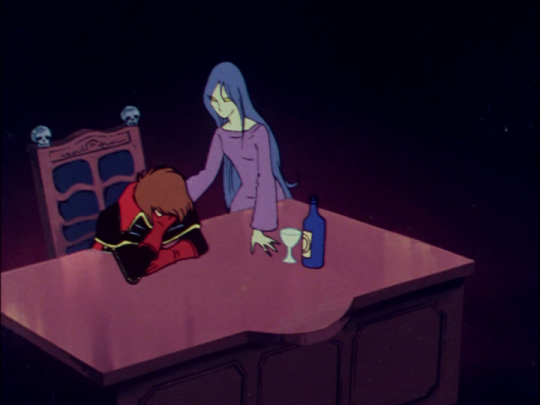
The entire Space Pirate Captain Harlock series is overshadowed by an atmosphere of quiet unshakable melancholy. It rests upon Harlock like a second cape, infusing all his actions and choices, unweakening in its hold on him from the first episode to the last. He is never freed from it, for this is a melancholy born of grief, of loss, and of a seemingly-futile yearning for what can never again be. Harlock is in a perpetual state of unending mourning – he mourns for an Earth whose natural beauty and splendor is fading with each passing year, he mourns for a humanity who has forfeited its dreams and visions of the future so as to live in a state of continuous apathy and sloth; but, above all, he mourns for the loss of his best friend, the man who never gave up hope either in humanity, the future, or even Harlock himself. Tochiro Oyama is dead (except in two flash-back episodes), and without that that spunky, optimistic genius-engineer at his side, Harlock’s natural inclinations towards pessimism and depression must be battled at every turn if he is to remain an effective apposing force in the fight against the Mazone. Harlock speaks in passing about ‘looking for a final resting place’ and about spending ‘a life wandering space, looking for a place to die.’ Harlock is a less hopeful and forgiving man then Tochiro, and is tempted often to abandon mankind and the Earth to its fate. But to abandon either of these things is, in effect, to abandon Tochiro himself, especially as his only child, Mayu, lives in an orphanage on Earth. To turn his back upon the planet and its people is to turn his back on Tochiro and his heirs and to scorn his friend’s dream of a better future. Almost against his will, Harlock denies Mazone Queen Lafresia the earth for Tochiro and Mayu’s sake, if nothing else, though he does wish to prove to humanity (who view him as a disruptive, peace-threatening menace to society) that he can and will protect them, regardless of his own negative feelings (or theirs). Prior to the Mazone’s arrival, Harlock lived a listless, goalless life of petty piracy, protected and entombed in a semi-haunted Arcadia infused with the soul and living brain-cells of Tochiro himself. His war with Queen Lafresia gives him a purpose again and rekindles his fighting spirit, but even when victory is achieved Harlock refuses to remain on earth; instead he self-exiles himself once more, leaving his entire crew behind, to continue wandering the stars - but this time, only Miime is allowed to accompany him.
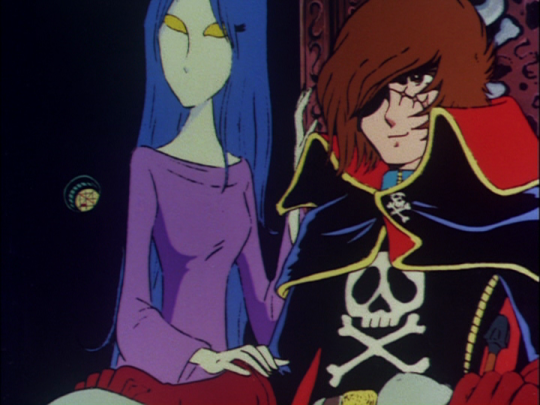
If Miime is dominated by her loneliness (and her literal ‘alone-ness’) then Harlock is ruled by his grief; no-one, not Miime, Tadashi or even Mayu, can take the place Tochiro holds in his heart. Harlock does not desire wealth, fame, acclamation, status as a hero or even to be respected and appreciated. He fights successfully to secure a future for the Earth but he cannot be apart of that future – for Harlock desires only the Arcadia of his youth, his past life with Tochiro, the long-ago days when it was just two carefree young men seeking to live free and pursue their dreams. But those times of youth and adventure cannot be reclaimed. Tochiro is dead (though still present) and Harlock can do nothing but carry on without him. He keeps Miime at his side, and she follows him willingly into the dark and to whatever fate awaits them. Earth may have been saved and mankind given a second chance, but for Harlock, Miime and Tochiro there is no going back home. Home does not exist for them anymore. Their only true home now is the Sea of Stars, their only banner the Jolly-Roger, and a life lived in freedom their only sustenance. Miime vanishes with Harlock into the vastness of space, remaining loyal to him to the last, even as Harlock remained loyal to Tochiro’s dream, the three of them uplifting and sustaining one another in their long exile. It is not necessarily a happy ending, but it is certainly a fitting one, appropriate to the nature of its characters and in keeping with the series’ overall mood and tone.
Thus wherever Harlock may go, Miime will always be at his side, a true companion he can rely upon for comfort and advice. For Miime, Harlock will always remain her savior and provider, and her comfort and advice are gladly given, since they both retain their freedom - which is, ultimately, all they ask for and in the end, as long as they remain within the confines of the Arcadia, is all they are allowed to have.
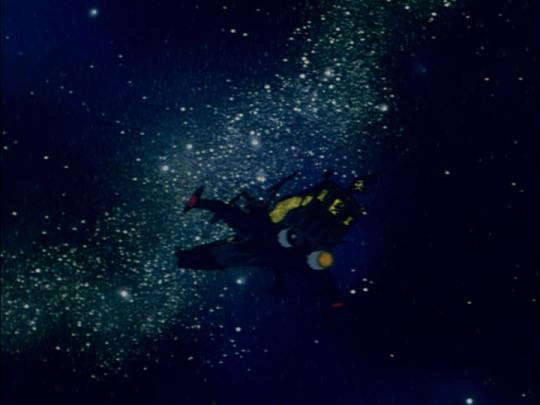
(1) You can only imagine how pissed-off I was when in the 2013 Space Pirate Captain Harlock CGI film, after Yama replaces Harlock as captain, Space-Elf!Miime declares that her loyalty is to the ship rather than Harlock himself. Boy that made me mad - that among so many other things.
(2) Harlock’s, Emeraldas’s and my own personality traits in a nutshell.
#Captain Harlock#Miime#Harlock article#Space Pirate Captain Harlock#screenshots#leiji matsumoto#leijiverse
45 notes
·
View notes